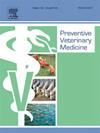Formulating antibiotic policy: Analysis of India’s ban on colistin use in food producing animals
IF 2.2
2区 农林科学
Q1 VETERINARY SCIENCES
引用次数: 0
Abstract
Antibiotics remain key tools for maintaining human health, and in many settings, food production. However, emergence of antibiotic resistance has become a global challenge, one that has resulted in multi-national calls for policy to improve antibiotic use. One such call has been to restrict the use of antibiotics deemed critically important for human health, such as colistin, during the production of food producing animals. Between 2016 and 2019 numerous countries, including India, implemented policies to heavily restricted the use of colistin in livestock. While this represents a key shift in the antibiotic policy landscape, other classes of critically important antibiotics continue to be used during food production. This paper provides a policy analysis of India’s 2019 colistin ban to provide insight into how this came to be and to identify factors which could shape the development of future legislation. The analysis revealed that while antibiotic reform in food production had been in the background of India’s policy agenda for some time, it took key-focusing events to shift the policy climate into a period of action. These focusing events included reporting of mobile colistin resistance genes in bacteria isolated from pigs in China and colistin resistant bacteria isolated from food samples in India. Consistent narratives had been built around colistin’s role as a last resort antibiotic which, together with relatively low proportion of colistin resistance in bacteria isolated from human patients, framed legislation as a worthwhile endeavour for policy makers. In addition, India acted as a global player in antibiotic stewardship and followed the precedent set by several other countries in restricting colistin use during food production. As most colistin for animal use was imported into India from China, and viable alternative animal treatments existed, there was limited industry opposition that could block legislation. We suggest evaluation of these five critical factors (focusing events, consistent narratives, worthwhile endeavour, precedent for change, and industry opposition) should be part of the policy formulation process for legislation regarding the use of other critically important antibiotics in food production.
制定抗生素政策:印度禁止在食用动物中使用粘菌素的分析
抗生素仍然是维持人类健康的关键工具,在许多情况下,也是粮食生产的关键工具。然而,抗生素耐药性的出现已成为一项全球性挑战,导致多国呼吁制定改善抗生素使用的政策。其中一项呼吁是,在生产食用动物的过程中,限制使用粘菌素等被认为对人类健康至关重要的抗生素。2016年至2019年期间,包括印度在内的许多国家实施了严格限制在牲畜中使用粘菌素的政策。虽然这代表着抗生素政策格局的重大转变,但在粮食生产过程中仍继续使用其他种类的至关重要的抗生素。本文对印度2019年的粘菌素禁令进行了政策分析,以深入了解这是如何形成的,并确定可能影响未来立法发展的因素。分析显示,虽然食品生产中的抗生素改革在一段时间内一直是印度政策议程的背景,但需要重点关注的事件才能将政策气候转变为行动时期。这些重点事件包括报告从中国猪中分离的细菌中发现了可移动的粘菌素耐药基因,以及从印度食品样品中分离出的粘菌素耐药细菌。关于粘菌素作为最后手段抗生素的作用,以及从人类患者中分离的细菌中粘菌素耐药性比例相对较低,已经建立了一致的叙述,将立法视为政策制定者值得努力的事情。此外,印度在抗生素管理方面发挥了全球作用,并遵循了其他几个国家在食品生产过程中限制使用粘菌素的先例。由于大多数用于动物的粘菌素是从中国进口到印度的,而且存在可行的替代动物治疗方法,因此行业的反对可能会阻碍立法。我们建议,对这五个关键因素(焦点事件、一致的叙述、值得努力的努力、改变的先例和行业反对)的评估,应该成为有关在食品生产中使用其他至关重要的抗生素的立法政策制定过程的一部分。
本文章由计算机程序翻译,如有差异,请以英文原文为准。
求助全文
约1分钟内获得全文
求助全文
来源期刊

Preventive veterinary medicine
农林科学-兽医学
CiteScore
5.60
自引率
7.70%
发文量
184
审稿时长
3 months
期刊介绍:
Preventive Veterinary Medicine is one of the leading international resources for scientific reports on animal health programs and preventive veterinary medicine. The journal follows the guidelines for standardizing and strengthening the reporting of biomedical research which are available from the CONSORT, MOOSE, PRISMA, REFLECT, STARD, and STROBE statements. The journal focuses on:
Epidemiology of health events relevant to domestic and wild animals;
Economic impacts of epidemic and endemic animal and zoonotic diseases;
Latest methods and approaches in veterinary epidemiology;
Disease and infection control or eradication measures;
The "One Health" concept and the relationships between veterinary medicine, human health, animal-production systems, and the environment;
Development of new techniques in surveillance systems and diagnosis;
Evaluation and control of diseases in animal populations.
 求助内容:
求助内容: 应助结果提醒方式:
应助结果提醒方式:


